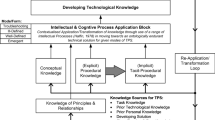Abstract
This paper reports on the analysis of student (ages 6–15 years) technological capability as they undertake technological tasks. The activities covered a number of different contexts (including different subject areas), and had differing degrees of openness and methods of presentation. Data was obtained from 261 of the 400 students that took part in the classroom activities. A holistic approach to analysing student performance was developed and this provided insights into the strategies adopted by the students. Some preliminary conclusions are: the focus of students on an end-product meant that they did not fully consider the processes that might be required to solve the problem; student technological approaches were influenced by the culture of the classroom; and existing concepts of technological processes influenced the approaches undertaken.
Similar content being viewed by others
REFERENCES
Hansen, R. & Froelich, M.: 1994, ‘Defining Technology and Technological Education: A Crisis, or Cause for Celebration?’, International Journal Technology and Design Education 4(2), 179–207.
Jones, A. T. & Carr, M. D.: 1993a, Towards Technology Education, Vol 1: Working Papers from the First Phase of the Learning in Technology Education Project. Centre for Science, Mathematics and Technology Education Research, University of Waikato.
Jones, A. T. & Carr, M. D.: 1993b,Analysis of Student Technological Capability, Vol 2: Working Papers from the Second Phase of the Learning in Technology Education Project. Centre for Science, Mathematics and Technology Education Research, University of Waikato.
Jones, A., Mather, V. & Carr, M.: 1995, Issues in the Practice of Technology Education, Vol.3: Working Papers from the Third Phase of the Learning in Technology Education Project. Centre for Science, Mathematics and Technology Education Research, University of Waikato.
Kimbell, R.: 1994, ‘Tasks in Technology. An Analysis of their Purposes and Effects’, International Journal Technology and Design Education 4(3), 241–256.
Kimbell, R., Stables, K., Wheeler, T., Wosniak, A. & Kelly, V.: 1991, The Assessment of Performance in Design and Technology, HMSO, London.
McCormick, R., Murphy, P. & Hennessy S.: 1994, ‘Problem-Solving Processes in Technology Education: A Pilot Study’, International Journal Technology and Design Education 4(1), 5–34.
Ministry of Education: 1995, Technology in the New Zealand Curriculum, Learning Media, Wellington.
Simon, S. A., Jones, A. T., Fairbrother, R. W., Watson, J. R. & Black, P. J.: 1991, Open Work in Science: A Review of Current Practice, Centre for Educational Studies, King’s College, London.
Author information
Authors and Affiliations
Rights and permissions
About this article
Cite this article
Jones, A. An Analysis of Student Existing Technological Capability: Developing an Initial Framework. International Journal of Technology and Design Education 7, 241–258 (1997). https://doi.org/10.1023/A:1008898501572
Issue Date:
DOI: https://doi.org/10.1023/A:1008898501572




